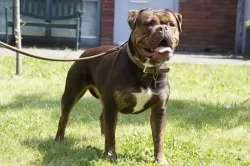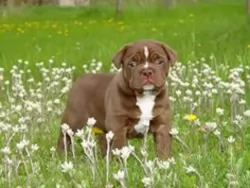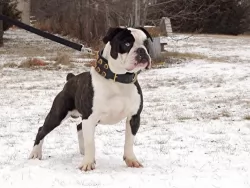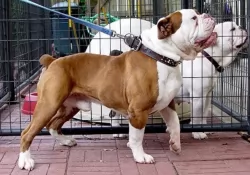 MyDogBreeds
MyDogBreeds Renascence Bulldogge is originated from United States but Briard is originated from France. Renascence Bulldogge may grow 13 cm / 5 inches shorter than Briard. Both Renascence Bulldogge and Briard are having almost same weight. Renascence Bulldogge may live 3 years more than Briard. Both Renascence Bulldogge and Briard has almost same litter size. Renascence Bulldogge requires Low maintenance. But Briard requires High maintenance
Renascence Bulldogge is originated from United States but Briard is originated from France. Renascence Bulldogge may grow 13 cm / 5 inches shorter than Briard. Both Renascence Bulldogge and Briard are having almost same weight. Renascence Bulldogge may live 3 years more than Briard. Both Renascence Bulldogge and Briard has almost same litter size. Renascence Bulldogge requires Low maintenance. But Briard requires High maintenance
 The Renascence Bulldogge, sometimes referred to as the Gargoyle – or Guardian bulldogs, came about by crossing the American Bulldogs with Bullmastiffs, Bandogges, English Bulldogs and Hermes Bulldogges.
The Renascence Bulldogge, sometimes referred to as the Gargoyle – or Guardian bulldogs, came about by crossing the American Bulldogs with Bullmastiffs, Bandogges, English Bulldogs and Hermes Bulldogges.
The idea was to re-create the working British Bulldogge breed of the 1800's. The Renascence Bulldogge is bred to a standard and is a rare dog. The idea was to bring about a dog like the English Bulldog but with less health problems.
There is a Renascence Bulldogge Kennel Club in existence.
 Through myth and legend, the Briard is thought to be a very ancient dog. A French herding breed, a Briard type of dog appears in writings as early as the end of the 14th century. According to legends the Briard was owned by Napoleon, Charlemagne, Lafayette and Thomas Jefferson. As a cross between the Barbet and the Beauceron, the Briard came into popularity following its appearance in a Paris dog show in 1863. Bred originally to guard and herd sheep, these intelligent, independent dogs were often left on their own. Because they both guarded and herded, their size and structure as well as their personalities were different from other dogs that worked sheep. Those that herded only were fast, agile and smaller. Those that only guarded were heavier, bigger and stronger. The Briard was in-between these two types of breeds. He was well suited to any kind of farm work and guarded the crops from the sheep’s desire to eat them. They moved the sheep from one grazing area to another and then to their holding area at night. No humans had to assist the Briard in this work once they were trained.
Through myth and legend, the Briard is thought to be a very ancient dog. A French herding breed, a Briard type of dog appears in writings as early as the end of the 14th century. According to legends the Briard was owned by Napoleon, Charlemagne, Lafayette and Thomas Jefferson. As a cross between the Barbet and the Beauceron, the Briard came into popularity following its appearance in a Paris dog show in 1863. Bred originally to guard and herd sheep, these intelligent, independent dogs were often left on their own. Because they both guarded and herded, their size and structure as well as their personalities were different from other dogs that worked sheep. Those that herded only were fast, agile and smaller. Those that only guarded were heavier, bigger and stronger. The Briard was in-between these two types of breeds. He was well suited to any kind of farm work and guarded the crops from the sheep’s desire to eat them. They moved the sheep from one grazing area to another and then to their holding area at night. No humans had to assist the Briard in this work once they were trained.
During World War 1, the Briards were drafted into service as messengers, sentries and search dogs for lost or injured soldiers. In that time frame the breed served almost to the point of extinction. Breeding programs following the war brought them back. Today the Briard is a home companion, a police dog, as well as both military and civilian search and rescue dogs.
 The Renascence Bulldogge is a well proportioned, muscular, medium sized dog with a large head and strong neck.
The Renascence Bulldogge is a well proportioned, muscular, medium sized dog with a large head and strong neck.
He can weigh between 27 to 41 kilograms and stand at between 43 and 56cm. A dock tailed is the preferred look, giving the dog a nice compact, distinguished look, but these days the tail is left to grow long. The coat is short and smooth and the colors are fawn, white and black. The eyes of the dog are low and wide, the muzzle broad and the ears are high set and semi-erect, semi-floppy. The back legs are muscular and heavy, quite a bit longer than the front legs.
Protective and territorial, the Renascence Bulldogge happens to also be a friendly, social, playful dog wih his human family. He tends to be a bit reserved and wary around strangers.
This powerful Molosser is also easy to train, and with training and socialization he becomes a pleasure to have around – obedient and well mannered.
 The Briard is a powerful, intelligent and independent working dog. They have a straight topline and their height is almost the same as their length. They have long, large, rectangular heads with wide muzzles. Their noses are also square and jet black while their side set, large eyes can be black-brown or black. Their ears have traditionally been cropped but with more countries outlawing it, they can now have natural ears set high on the head. They have a tail that is feathered and low-cut. The feet of a Briard are round, compact and large.
The Briard is a powerful, intelligent and independent working dog. They have a straight topline and their height is almost the same as their length. They have long, large, rectangular heads with wide muzzles. Their noses are also square and jet black while their side set, large eyes can be black-brown or black. Their ears have traditionally been cropped but with more countries outlawing it, they can now have natural ears set high on the head. They have a tail that is feathered and low-cut. The feet of a Briard are round, compact and large.
The Briard is a double coated breed with a long beard and mustache. Their hair completely covers the head and the eyes so that they are not seen. They have prominent eyebrows as well.
 The Renascence Bulldogge is a rare dog and they are now being bred more often by people who love the English Bulldog but who don't want so many health problems.
The Renascence Bulldogge is a rare dog and they are now being bred more often by people who love the English Bulldog but who don't want so many health problems.
The Renaissance Bulldog is a lot more healthier and more robust than the English Bulldog. The best part is that he has the English Bulldog's characteristic look. Bring him into your home and you’ll have an entertaining, social, playful, loving pet and companion.
 As mentioned previously the Briard is intelligent and independent. They are also loyal, rugged, protective and bond intensely with their humans. They are often aloof when it comes to strangers or even when new furniture is introduced into the household. They have to learn that anything new into the family environment is friendly and good. They are great with children and susceptible to separation anxiety because of their deep affection for their people. Socialization for puppies is a must. This will let them know that people and children, other dogs in general are not harmful to their families. They have great memories and once they learn something – right or wrong – it is almost impossible to change it. They were bred to be independent thinkers who acted on their own conclusions. This is still true of the breed today, making them appear to be stubborn.
As mentioned previously the Briard is intelligent and independent. They are also loyal, rugged, protective and bond intensely with their humans. They are often aloof when it comes to strangers or even when new furniture is introduced into the household. They have to learn that anything new into the family environment is friendly and good. They are great with children and susceptible to separation anxiety because of their deep affection for their people. Socialization for puppies is a must. This will let them know that people and children, other dogs in general are not harmful to their families. They have great memories and once they learn something – right or wrong – it is almost impossible to change it. They were bred to be independent thinkers who acted on their own conclusions. This is still true of the breed today, making them appear to be stubborn.
They are great watchdogs, fearless and brave; willing to learn, eager to make you happy. They are basically gentle but that always runs up against their protective nature. A strong alpha leader is needed to handle this hard-working dog.
 Your Renascence Bulldogge can live to be anything from 10 to 15 years of age with good care.
Your Renascence Bulldogge can live to be anything from 10 to 15 years of age with good care.
Heat stroke is a concern with the Renascence Bulldogge, and even with his daily walk, you will have to keep an eye on him You must never ever leave him alone in a hot car. These dogs have breathing problems as it is and overheating can kill him.Suffering from heatstroke is regarded as an emergency situation.
Any dog can suffer with bloat, not only the Renascence Bulldog. If your dog’s stomach is bloated, he will have a hard, swollen stomach, he will be restless and trying to vomit. This is also a life threatening condition.
Also referred to as canine atopic dermatitis, the Renascence Bulldog sometimes has to contend with this non-parasitic infection. Your poor dog will have dry, itchy skin and he can become frantic with this. You will need to get him to the vet.
Other things to look out for with your Bulldogge are hip dysplasia, cancer and eye infections.
 Being a large breed, the Briard shares many of the same health concerns as other large breeds. They have a few of their own as well. Typical issues for a Briard might include:
Being a large breed, the Briard shares many of the same health concerns as other large breeds. They have a few of their own as well. Typical issues for a Briard might include:
Progressive Retinal Atrophy/Degeneration –degeneration of the photoreceptors and retina.
 Your Renascence Bulldogge is a special, loving pet, but keeping him healthy can be a bit of a challenge.
Your Renascence Bulldogge is a special, loving pet, but keeping him healthy can be a bit of a challenge.
A walk every day will be a good form of exercise for this dog.
Your pet is one of these dogs that has quite a few layers around the face.You will need to wipe between these folds with a damp,warm cloth or with a natural,gentle anti-fungal wipe.
His skin can become irritated with the layers of skin and you don’t want such a cute pet to battle with a itchy rash on his skin.
Your Renascence Bulldogge is going to need the very best food you can give him. The commercially manufactured foods are nice and convenient and the best ones are well balanced.
It’s nice to be able to give your Bulldogge some delicious home-made food, bearing in mind that dogs like simplicity and consistency.
Boiled chicken, brown rice or pasta and sweet potatoes, spinach and carrots all chopped up and added to your dog’s dry kibble twice a week will delight him. It will ensure he is healthy ad happy. A little bit of raw meat can also do wonders for his health. Never leave him without a constant supply of fresh, cool water.
 It is best to feed the Briard smaller meals 2-3 times a day to prevent bloat. Feed 3-4 cups total for the day of a dry dog food that is high quality and made for large breeds.
It is best to feed the Briard smaller meals 2-3 times a day to prevent bloat. Feed 3-4 cups total for the day of a dry dog food that is high quality and made for large breeds.
Stationary Night Blindness – Congenital limited vision in the dark can vary from slight difficulty moving to complete inability to see in the dark.
Progressive Retinal Atrophy/Degeneration – Can lead to night blindness, limited or total blindness. Puppies with the disease can be blind before their first birthday.
Bloat (Gastric Torsion) – Stomach is distended and twists. Fatal if not treated quickly. Caused by eating a large meal quickly and either exercise immediately or drink a large amount of water right after eating.
Von Willebrand’s Disease – Blood clotting disorder leads to excessive bleeding. There is no cure, but it is manageable.
The Briard is a working dog and as such needs a job. They excel at agility, flyball, herding, obedience, confirmation and tracking. They need exercise and make excellent service dogs for people with disabilities and therapy dogs for those in emotional need.